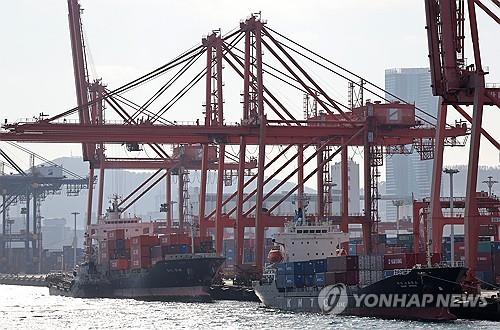KDI keeps S. Korea's economic growth outlook at 2.2 pct for 2024

SEOUL, Feb. 14 (Yonhap) -- A major South Korean state-run think tank said Wednesday it maintains the country's economic growth outlook for this year at 2.2 percent as rising exports are projected to lead a gradual recovery despite weak domestic demand.
The Korea Development Institute (KDI) presented the same figure as that in its November report, and the projection was on par with that by the South Korean government and the Organization for Economic Cooperation and Development.
The Bank of Korea (BOK) expected 2.1 percent growth for 2024, while the International Monetary Fund forecast a 2.3 percent expansion.
"The economy is expected to recover gradually on the back of growing exports centering on solid demand for semiconductors," the KDI said in the latest report.
"High interest rates have affected construction investment, in particular, and are likely to weaken private consumption. But export circumstances are expected to improve as the outlook for the global economy has gotten better," the report read.
The KDI revised down its growth forecast for private consumption this year from 1.8 percent to 1.7 percent, but raised the forecast for export growth to 4.7 percent from its earlier projection of 3.8 percent.
Annual inflation is expected to stand at 2.5 percent in 2024, the KDI said, revising down its projection by 0.1 percentage point as dwindling domestic demand is likely to ease inflationary pressure faster than expected.
Given the downward trajectory of prices, the central bank could consider lowering interest rates in the second half, according to the KDI.
The BOK has frozen its key interest rate at 3.5 percent following seven consecutive rate hikes from April 2022 through January 2023.
Despite falling consumption, the KDI expected the country to add 220,000 new jobs this year as the hiring of women in their 30s and senior citizens are expected to grow. In the November report, it forecast 210,000 new jobs.
For major challenges, the institute cited geopolitical uncertainties in the Middle East, which could push up global oil prices and disrupt logistics, as well as the drastic slowdown in the Chinese economy centering on the real estate sector.
"At home, chances seem low for the ongoing restructuring in the construction sector to evolve into overall financial system risks, but we cannot rule out the possibility of the matter causing a credit crunch in relevant sectors and negatively affecting the real economy," the KDI said.
In 2023, South Korea's real gross domestic product, a key measure of economic growth, increased 1.4 percent. Exports climbed 2.8 percent and private spending gained 1.8 percent. Facility investment added 0.5 percent, according to the BOK data.
During an emergency economic ministers' meeting on Wednesday, Finance Minster Choi Sang-mok vowed to "employ all possible policy means" to improve the livelihood of the people.
graceoh@yna.co.kr
(END)





